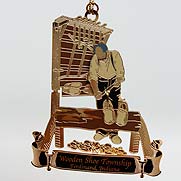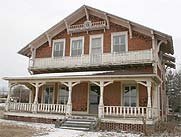2008 Essays — 3rd Place A Tasteful Tale: A Life Story of My Grandma by Kelsey Harmon
The first thought that comes to mind when people think of Birdseye is generally a small town with amazing ice cream and incredible home-cooked food. Food, however, is not the main reason people came to Birdseye. Many people did business or came for pleasure. Norma (Linthicum) Harmon has lived in Birdseye since she was a small child.
She told me, “I was born in Orange County, on August 1, 1934, when doctors made house calls and delivered babies at homes. I lived on a farm where I milked cows, and fed hogs, horses and chickens. The work had to be done every morning before and after school. We then walked a mile and half to catch the school bus. When we had high water — because the bus wouldn’t cross our creek — we walked across a foot log. Our dad sometimes took us out to State Road 145 when he was not busy farming. He also took my mother to school every morning and would have to go and get her that evening. We went — my parents, brother, and sister — to French Lick shopping once a month whenever my mother received her paycheck. We went by Handy Andy’s — an ice cream shop — for a treat. We were happier than children are today with our trip. My dad and mother owned a Model-A car.”
Today, schools are much different from when my grandma went. For example, she said, “We had an old pot belly coal stove that the teacher fired before the kids came. All eight grades were in one room, with no more than eighteen or twenty kids studying in one room. We ate a cold sack lunch everyday along with water to drink. Some of the older children walked to a spring or carry water into our hall and coatroom. Everyone hung their coats in one room. The doors did not have locks. Books were kept in our school desks, and no one bothered anything from our desks. The classroom is where everyone ate lunch and played games. We did not have a gymnasium for activities. Boys and girls played games together outside such as softball and hopscotch. We had one teacher and no teacher aid as they do today. Some older kids would help the younger kids with their lessons. Since we had nothing like computers, some of us older grandparents know nothing about this newer school program.”
Since she has lived in Birdseye her whole life, many businesses, people, and buildings have changed. She recalls, “Many of the older people have passed away; younger ones live here now. We have no factories, our blacksmith shop is gone, and our train does not run anymore. I took the train to work at Huntingburg, Indiana, when I was sixteen years old. Birdseye had a large tomato factory and a chair factory, which both burned down. An old feed mill is still standing but not in operation. Now we have a grocery store, post office, gas station, flower shop, fire department, ice cream shop, gun shop, five churches, a tavern, liquor store, beauty shop and an antique store.”
When I was younger, I had many toys to play with and store bought dolls. My grandma’s experiences, however, were different. “I had very few toys — homemade cloth and paper dolls,” she said. “My sister and I played with these dolls and kept these dolls for many years. Our grandmother gave us a handkerchief for Christmas with lace crochet around the outside edge, which we really cherished. Our dresses were made out of feed sacks that my parents bought chicken feed in. My mother washed them and made our dresses, of which we had very few. Shoes were much rationed also. We had stamp books where we could only buy a few pair a year. It was not easy making our shoes last through the school year. Starting in early spring and most of the summer we went without shoes. We had no store bought games as I remember. We played X and O on paper and made mud pies. We also played skip rope, made from binder twine. My parents worked very hard and had to make their money go a long ways.”
Teenagers this day and age usually do not start work until they are in school, or when they can drive. Most of them make $5.85 per hour. My grandma’s work experience was unlike ours today. She said, “At sixteen, I road a train to Huntingburg, Indiana. I stayed with a Stanley dealer who held parties at friends’ homes. I made thirty dollars a week. I was her housekeeper, did cooking, laundry, and cleaning. I enjoyed my job at that age and made a lot of money in those days. At nineteen, after graduating from high school, I worked in Orleans, Indiana, at Traveler’s Company, for one year. I made forty dollars a week and paid five dollars a week for my ride back and forth. My dad drove me to Birdseye to catch my ride with six other ladies who worked there. We made radios and televisions on an assembly line with other people.
“I moved to Terre Haute, Indiana, and married Vern Harmon on March 25, 1955. We lived there ten years and gave birth to three sons in 1956, 1957, and 1963. We then moved back to Birdseye after my father had a stroke in 1965.”
Many parents today went to college to get an education so they could have a long-term career. My great-grandparents did have the option but only for one or two years. My grandma said, “My mother graduated from Birdseye High School in 1918. She lived in Birdseye during the week, renting a room for less than one dollar. Her dad would bring her to Birdseye every Sunday evening by horse and buggy and came over every Friday to take her home to Wickliffe, Indiana. She became a grade school teacher after college. For thirty years she taught in Dubois, Orange and Crawford Counties with my father taking her back and forth every day.
“My father farmed for many years. Then, after we moved to Birdseye, he worked for the county highway department. Eventually, he went to work at a factory in Jasper for several years. They both retired when they were old enough for social security. My father passed away in the year of 1979 when he was seventy-four. My mother lived alone eight years longer, with me living beside her, helping care for her. She was eighty-two when she died. They both worked many years and enjoyed their lives together. Both now rest in peace at the Birdseye Cemetery.”
On the weekends I like to hang out with my friends. We sometimes go to the movies or shopping. During the week we occasionally go to Jasper. When my grandma did not have chores to do, she did not have these opportunities. “Most days we had things to do,” she remembers, “chores inside and outside and helping my dad with farm work. On Sunday evening my sister and I would walk to Birdseye to visit with our friends. Every so often we would get a ride back home before dark. Other times went fishing and swimming with our neighbor kids. We made doll clothes from our mother’s scrap material leftover from feed sacks.”
I have lived in Birdseye since I was born. Nothing drastic has ever happened that I can remember. As for my grandma, she remembers a big fire in 1949. “When I was a freshman at Birdseye High School a fire burned thousands of acres on our farm and other farms. The National Guard units were brought here to help fight it. People came from other counties as site spectators. It burned for several hours before they had it under control and finally put it out in early hours of the morning. This is the most excitement in Birdseye that I have experienced in my lifetime. I have lived here most of my seventy-three years.”
Living in the residential area of Birdseye, it does not take me that long to get to the business district — especially now that I have a car. Sixty years ago, however, it was not this easy. My grandma recalls, “I lived one and half miles south of Birdseye on State Road 145 by the Anderson Creek. I have seen lots of high water over the roadway between our house and Birdseye. Some people would drive through, get stranded, and end up wading out.
“Some Sunday mornings we walked to Birdseye to visit our friends. We ate ice cream or had a soda at Alta Pruitt’s restaurant, the only one in town. Everyone gathered there just for fun.
“As we grew older, we were able to drive our dad’s car for a night out. We had to be home by seven or eight o’clock. Our parents were very strict because we did not have it like kids nowadays.”
About once or twice a year I go on a vacation, either with my family or a friend. Most teenagers go to places on spring break or during the summer. When money was sparse, my grandma did not go anywhere. “We never went on vacations; our parents had other needs for their money. We enjoyed our farm life. A vacation for us was going to French Lick on Saturday evening for a few groceries.”
My grandma had a great time growing up. People enjoyed life with much contentment. She states, “Today’s kids have too much and do not appreciate or respect the good life they have. Everyone and everything goes at such a fast pace that people cannot enjoy life like we did.
“People should learn to save and do without materialistic items. Social Security is gone for them, due to the world spending faster and owing such large debts. If we are not careful, the country may never recover from its financial spending.”
In conclusion, Norma Harmon has enjoyed her life living in the small town of Birdseye. Today, she works at the Birdseye General Store throughout the week. She looks forward to people passing through town to get a taste of relaxation. She also hopes people take the time to stop by our tiny town and enjoy an ice cream without the hustle and bustle of everyday life.



